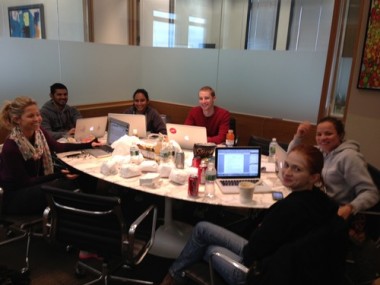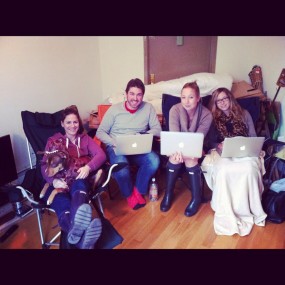As the Power Returns, E-Commerce Sites Turn Their Attention to the Holidays
Technology companies are largely considered resilient in natural disasters. When one server goes down, a redundant one across the country lights up to pick up the slack. And when employees can’t make it to the office, they work remotely with a laptop and a broadband connection.

Source: Fab.com. Employees at Fab.com work from the offices of Zelkova Ventures, one of Fab’s earliest investors.
But last week, superstorm Sandy proved that even virtual organizations have their kryptonite.
As the power went out in parts of New York and New Jersey, e-commerce sites dealt with the realities of the physical world as warehouses came to a screeching halt and trucks could not get through flooded streets to make deliveries.
To add to the burden, the lack of electricity in both offices and employees’ homes made getting online to conduct business even more difficult.
Niraj Shah, the CEO and co-founder of Wayfair, said this morning that the Boston-based home decor site witnessed the effects second-hand. At the peak of the storm, 1,300 of its 4,000 suppliers were offline, he said, and today, 63 of its suppliers are still cleaning up after the floods. Shah said on Friday, one of its suppliers filled one particularly urgent order by flashlight, but in other cases, items were removed from its site if they knew it would take too long to get to customers’ homes.
“We are always monitoring the fill rate and lead time,” he said. “We had a couple of suppliers running on generators or flashlights to keep some volume moving.”
Other e-commerce sites based in the Northeast, including Fab.com, OpenSky, Gilt Groupe and Diapers.com, saw the impact from the storm first-hand.
Fab.com, which sells quirky home decor and apparel online, lost power at its headquarters in the West Village and at two of its warehouses in New Jersey.

Source: Lot18 Lot18 employees displaced by Superstorm Sandy find alternate places to work.
During the chaos, co-founder and CEO Jason Goldberg wrote about the challenges on the company’s blog. “About 1/3 of our employees lost power at home. Some of our team members suffered damages to their homes and property. Our offices and our warehouses lost power. But, thankfully everyone in the Fab Family is safe,” he wrote.
Last week, Goldberg said employees found makeshift places to continue the task of listing 1,000 new products to the site every day. Employees gathered at the homes of other employees, including Goldberg’s apartment, where the company was originally founded. Fab’s warehouses regained power late Friday, and employees returned to the office this morning.
Goldberg said the cooperation among employees was one of the most touching things he has seen in his career. “On a professional level, nothing — nothing — compares to the actions I saw this week by Fab’s team members who joined together, opened their homes to one another, and who showed courage and leadership and family during a challenging time.”
New York-based Gilt Groupe, which also posts hundreds of new products to their site every day, regained power in its photo studio in Brooklyn on Thursday, and employees pulled double shifts for the last few days to make sure the inventory was ready to be listed on the site. Its corporate office in Manhattan opened today after regaining power over the weekend.
The employees of Lot18, which sells wine online, said they kept the juices flowing by working from each other’s homes. Based on several photos posted to the company’s blog, the big beneficiary of the work-from-home policy seemed to be the employees’ cats and dogs, who were noticeably on or near their humans.
After its headquarters was flooded by the Hudson River, Amazon-owned Diapers.com sent an email to customers on Thursday, apologizing for outages Wednesday that took some Web sites — including Wag.com and Yoyo.com — down for a few hours and warning that shipments may be delayed in areas most affected by the storms.
“A company is only as strong as the people behind it, and we are so grateful to our employees for their unwavering commitment. This past week has been a difficult one for us, as we know it has been for many of you,” wrote the company’s co-founders, Marc Lore and Vinit Bharara, in a letter to customers. “We are headquartered in Jersey City, in a building a few feet from the Hudson River that serves as the place of work for most of our corporate staff and customer care team. The building was flooded by Hurricane Sandy and continues to be inaccessible. For a period of time, we also lost power in one of our warehouses.”
A Diapers spokesperson did not return emails seeking information on the recovery efforts, but according to one customer, it’s business as usual.
“If Diapers.com is hurting, you wouldn’t know. I use them religiously and despite a brief down time on their site (the first I’ve seen since I had my older daughter three years ago) I haven’t noticed a thing,” said Emily Lawi, who is the VP of communications of OpenSky and is returning to work today for the first time since the storm. “I actually ordered from them on Wednesday night and like usual my package arrived midday Friday. I was super impressed.”
If most retailers return to full capacity today, it will be just in time for the holiday shopping season, which starts ramping up this week and continues straight through to Christmas. Others that experienced significant damage to warehouses or inventory won’t be as lucky. At this point, it’s too late to reorder inventory from suppliers around the globe before the holidays. Many economists expect the storm to shave up to half a percentage point from growth in the fourth quarter, according to the New York Times.








